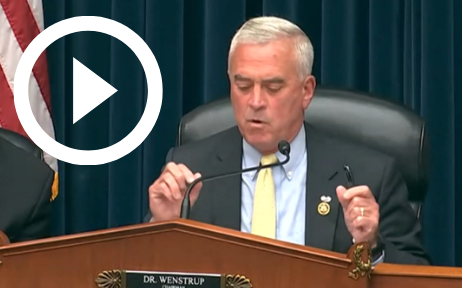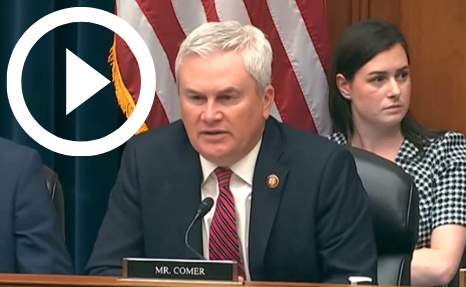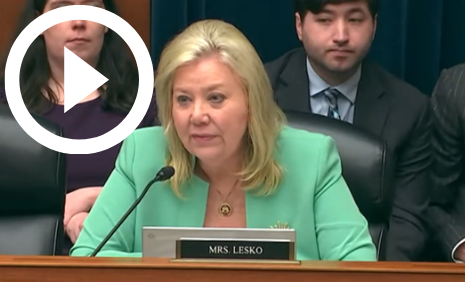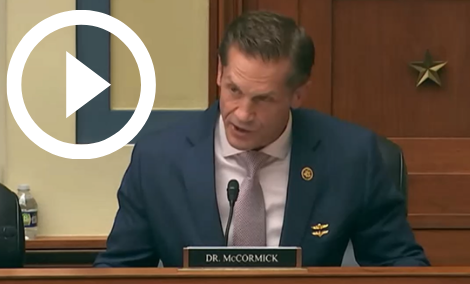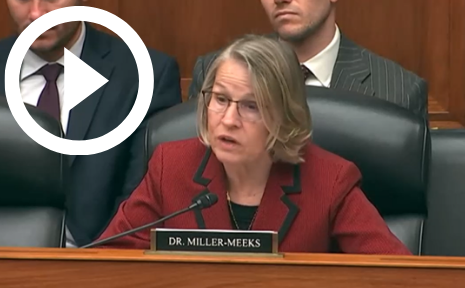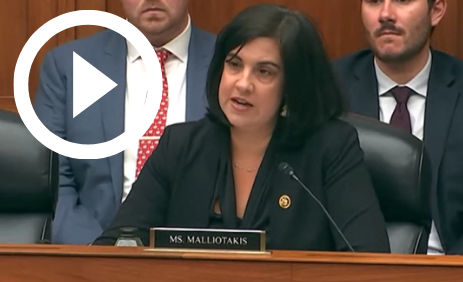Hearing Wrap Up: NIH Refutes EcoHealth’s Testimony, Tabak Reveals Federal Grant Procedures in Need of Serious Reform
WASHINGTON — The Select Subcommittee on the Coronavirus Pandemic held a hearing titled “Overseeing the Overseers: A Hearing with NIH Deputy Director Lawrence Tabak” to examine the National Institutes of Health’s (NIH) process for funding and overseeing scientific research as well as investigate NIH’s relationship with EcoHealth Alliance, Inc. (EcoHealth). Members pressed former Acting NIH Director and current Principal Deputy Director, Dr. Lawrence Tabak, to explain numerous inconsistencies between the public and private testimonies of NIH employees and EcoHealth President, Dr. Peter Daszak. Dr. Tabak offered substantial evidence that Dr. Daszak purposefully misled both the NIH and the Select Subcommittee about EcoHealth’s efforts to comply with grant procedures. In a shocking admission that directly contradicts Dr. Fauci’s previous statements, Dr. Tabak testified that the NIH was funding gain-of-function research in Wuhan, China through a grant to EcoHealth. Members highlighted the dangers of continuing to fund gain-of-function research in foreign laboratories where NIH cannot ensure proper biosafety measures are implemented. Both Dr. Tabak and Select Subcommittee Members agreed that, in “hindsight,” the NIH could have done more to protect the American taxpayer from EcoHealth.
Key Hearing Takeaways
- NIH Deputy Director and former Acting NIH Director, Dr. Lawrence Tabak, acknowledged that NIH funded gain-of-function research in Wuhan, China.
- Dr. Lawrence Tabak repeatedly refuted EcoHealth Alliance President Dr. Peter Daszak’s public and private testimonies. It is now clear that Dr. Daszak misled both the Select Subcommittee and the NIH on numerous occasions.
- Serious shortcomings and failures in the NIH’s grant awarding and grant oversight procedures enabled EcoHealth to facilitate gain-of-function research in Wuhan, China. These NIH deficiencies were exploited by Dr. Daszak and his team in an effort to avoid oversight and maintain funding.
- The U.S. Department of Health and Human Services’ (HHS) decision to immediately suspend funding and commence debarment proceedings against EcoHealth is backed by substantial evidence and necessary to protect America’s national security. The Select Subcommittee also recommends that HHS immediately begin debarment proceedings against Dr. Peter Daszak personally.
- The NIH often lacks the necessary subject matter and scientific expertise to ensure U.S. taxpayer funds are spent and overseen safely. Dr. Tabak testified to these gaps in NIH’s system today, and former NIH Director Dr. Francis Collins recounted similar problems during his transcribed interview found here.
- The Select Subcommittee’s investigation into EcoHealth’s impropriety is far from over. Chairman Wenstrup appreciates Dr. Tabak’s honesty today and intends to use his testimony to hold EcoHealth accountable for its facilitation of gain-of-function research and its blatant contempt for the American taxpayer.
Member Highlights
Select Subcommittee on the Coronavirus Pandemic Chairman Brad Wenstrup (R-Ohio), D.P.M, pressed Dr. Tabak to address Dr. Daszak’s testimony that EcoHealth was “locked out” of the NIH’s grant reporting system. NIH conducted an internal forensic audit which proves EcoHealth was, in fact, not “locked out” from submitting its required NIH grant research update report on time. Notably, EcoHealth finally submitted its report nearly two years after the required deadline. According to the facts gathered by NIH, Dr. Daszak’s sworn testimony appears to be false.
Chairman Wenstrup: “EcoHealth, like every other NIAID grantee, was required to submit a five-year progress report, as you know. This report was submitted nearly two years late. Dr. Daszak testified that EcoHealth had tried to submit the report on time but was locked out of the NIH system. Dr. Lauer testified that a forensic audit was conducted, and no such system error was detected. Is NIH now willing to share the findings of this forensic audit with the Select Subcommittee?”
Dr. Tabak: “We certainly will work together with you to obtain things that you require, sir.”
Chairman Wenstrup: “Does the audit indicate that EcoHealth could have submitted their report on time?”
Dr. Tabak: “That’s what our audit indicates, yes.”
Chairman Wenstrup: “When EcoHealth eventually submitted its year-five report, Dr. Daszak testified it took 11 days to unlock the NIH system. Is this true?”
Dr. Tabak: “We have no evidence of that.”
…
Dr. Tabak: “All I can say to you is that our system did not lock them out and there was no impediment for them to provide that report on time.”
Committee on Oversight and Accountability Chairman James Comer (R-Ky.) questioned Dr. Tabak about the employment status of alleged federal records violator and top advisor to Dr. Anthony Fauci — Dr. David Morens — who was placed on administrative leave after the Select Subcommittee uncovered incriminating information. Dr. Morens used his personal email(s) to hide conversations about the origins of COVID-19 and undermine the operations of the NIH.
Chairman Comer: “What is Dr. Morens’s current employment status?”
Dr. Tabak: “He is an employee of NIH.”
Chairman Comer: “Well, I think you see where my lines of questioning were leading. We have some serious concerns. We have fought in this Select Subcommittee, the Oversight committee, on obtaining information. And here you have an admission of deleting information, going to great lengths to not be transparent, in an apparent cover-up of something that I think we would agree, in a bipartisan manner, is one of the most serious issues that our country has ever faced, the COVID 19 pandemic.”
Rep. Debbie Lesko (R-Ariz.) elicited an admission from Dr. Tabak that the NIH funded gain-of-function research at the WIV through a grant to EcoHealth. This directly contradicts Dr. Fauci’s U.S. Senate testimony in 2021 in which he claimed the NIH “has not ever and does not now fund gain-of-function research in the Wuhan Institute of Virology.” This type of research is known to be dangerous and even former NIH Director Francis Collins and Dr. Fauci were willing to admit that there are risks associated with this experimentation.
Rep. Lesko: “Dr. Tabak, did NIH fund gain-of-function research at the Wuhan Institute of Virology through EcoHealth?”
Dr. Tabak: “It depends on your definition of gain-of-function research. If you’re speaking about the generic term, yes, we did…the generic term is research that goes on in many, many labs around the country. It is not regulated. And the reason it’s not regulated is it poses no threat or harm to anybody.”
Rep. Rich McCormick (R-Ga.), M.D., proved that EcoHealth violated the terms of its NIH grant when it failed to produce “laboratory notebooks” with information about the WIV’s gain-of-function research. On May 1, Dr. Daszak falsely testified that he was not required to produce these notebooks as a condition of his grant.
Rep. McCormick: “When the National Institutes of Health requested the notebooks from EcoHealth, was EcoHealth required to produce them under its grant terms?”
Dr. Tabak: “Yes, they were.”
Rep. McCormick: “When NIH requested notebooks from EcoHealth should EcoHealth have been able to access them or already have access to them?”
Dr. Tabak: “That’s correct.”
Rep. McCormick: “Did EcoHealth ever produce the requested notebooks?”
Dr. Tabak: “They have not.”
Rep. McCormick: “Dr. Daszak testified two weeks ago that he was not required to produce the lab notebooks. Would NIH disagree with that testimony?”
Dr. Tabak: “Yes, we disagree with that testimony.”
Rep. McCormick: “The testimony here today clarifies the inconsistency between Dr. Daszak’s testimony and the testimony of numerous NIH officials and NIAID officials, also, including yourself. Dr. Daszak continues to thwart congressional oversight through semantics and outright dishonesty, quite frankly. He has routinely failed to produce pertinent documents and made countless misleading statements to the Select Subcommittee right here.”
Rep. Mariannette Miller-Meeks (R-Iowa), M.D., uncovered serious shortcomings in NIH’s grant awarding and grant oversight procedures. Dr. Tabak testified that he would never again support a grant to EcoHealth Alliance to fund gain-of-function research in Wuhan and believes the NIH relied too heavily on Dr. Daszak attestations. .
Rep. Miller-Meeks: “As I mentioned, the Understanding the Risk of Bat Coronavirus Emergence Grant was an almost $4 million grant that partially went to the Wuhan Institute of Virology and the Wuhan University of Public Health. Do you believe this grant was an effective use of taxpayer dollars, and would you support issuing the same grant today?”
Dr. Tabak: “Well, with the benefit of what we know today, no, of course not.”
Rep. Miller-Meeks: “There is great concern with Dr. Daszak interaction with NIH and NIAID pertaining to the one log growth term of the award. The NIH relied on Dr. Daszak to monitor and report virus growth after being a month late on his annual reporting requirements, which were outlined in the grant. Dr. Tabak, looking back, did the NIH rely too much on Dr. Daszak’s self-reporting information?”
Dr. Tabak: “Again, with the benefit of hindsight, we did because we never received the information.”
Rep. Miller-Meeks: “Well, as an ophthalmologist, hindsight is always 20/20.”
Rep. Nicole Malliotakis (R-N.Y.) revealed NIH’s honest viewpoint regarding its funding of EcoHealth’s risky research at the WIV. Dr. Tabak testified that NIH believed it was not funding any dangerous research prior to or during the COVID-19 pandemic.
Rep. Malliotakis: “We also know that at least 20 more EcoHealth research projects received funding since March of 2020, and they are conducting research Nipah, zoonotic viruses, bat coronaviruses, MERS. They are doing a lot of this research, mostly actually in third world countries. Subpar safety conditions. How do you ensure that our federal dollars are not going to do risky experiments in countries where there are subpar safety regulations? And do you believe that should be a criteria that is put forth to ensure that the money doesn’t?”
Dr. Tabak: “Well, again, once we established special conditions for award on EcoHealth Alliance, we have monitored them very carefully with regard to expenditure and with regard to their various administrative processes. There was never a concern with the danger, if you will, of the experiments that NIH approved for EcoHealth Alliance to with under subaward with WIV.”
###
